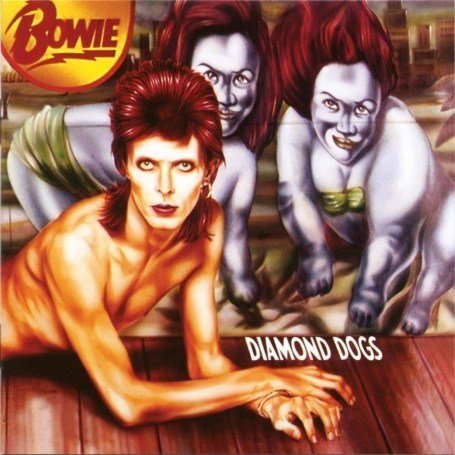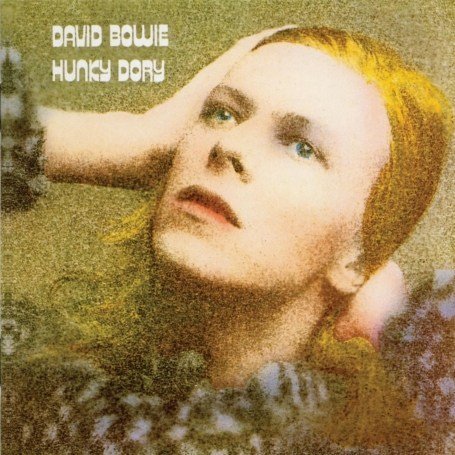(For Part One, go here.)
Station to Station and Low
I bought these two albums on the same day, a rather memorable one, in fact. It was my senior year of college in Omaha, and it was spring break, but I was not able to go home due to a combination of blizzard and needing to prepare for competition at nationals with my debate team. (Again, very un-Bowie.) It was one of those wretched late winter March days that the Midwest seems to specialize in, a cold dead sky and streets covered with ice when spring should have already sprung. I was coming down with a fever, probably induced by getting my feet wet digging the Mazda out of a snow drift. For some perverse reason I decided I needed to get out of the house for a drive (maybe to justify the hard labor of snow shoveling), and drove with my girlfriend to the Best Buy near 72nd and Dodge. (Remember when that was the place to get cheap CDs? One of the lost experiences of the 90s, I tell you.) It was unnecessarily exciting, since Omaha is so hilly, and sheets of ice had yet to melt. I distinctly recall skidding my way down the hill that slopes down on Dodge to 72nd. On the way home I bought a twelve pack of Schiltz because it was a helluva of a deal at four bucks and spent the evening sipping a medicinal brew while watching the NCAA basketball tournament.
I must've purchased these two albums that day because two of my favorite books about music, Jon Savage's England's Dreaming and Lester Bangs' posthumous compilation Psychotic Reactions and Carburetor Dung had encouraged my to check out stuff from Bowie's post-glam pre-Let's Dance period (roughly 1975-1980.) Bangs was not a fan of Bowie at all, but had plenty of good things to say about Station to Station, which is one of the more forgotten entries in the Thin White Duke's run of shape-shifting 1970s greatness. Low came out of the same Berlin period as "Heroes", and Savage praised both records in his now classic history of British punk rock. Yes kiddies, in that pre-internet age we oldsters had to take a leap of faith on obscure music that we had read about, plunking our cash on the barrelhead before hearing a solitary note. ("Golden Years" was the only song on either record I'd ever heard before.)
I was not disappointed. Station to Station has got some great grooves on it ("Golden Years," "Stay"), as well as two fantastic ballads, sung in Bowie's newly discovered, lower voice ("Wild is the Wind," "Word on a Wing." At the time, I gave it many more spins that Low, which at that time, and for a long time after, became a record I played when I got sick. It makes sense, since Bowie recorded it while recovering from illness and a monumental cocaine addiction. The songs on the first side sound ill at ease in the world and explore depressing territory -"Always Crashing in the Same Car" especially- while instrumentals dominate the second side. These songs (or rather moods) make a good soundtrack to staying inside and wallowing under the blankets. My favorite, "Warszawa"sounds like a deathly quiet Sunday afternoon in a city of lost souls, and was the perfect accompaniment to me walking to work this morning in the cold January rain.
Diamond Dogs
After graduating from college, I went for a master's degree at Midwestern Ivy University in Chicago (you can probably guess what school I'm talking about.) My Bowie fixation peaked around this time due to the release of the film Velvet Goldmine. My old college buddy D had also moved to Chicago to study at Chicago Jesuit University on the north side, and we often got together on the weekend to enjoy the city that both of us soon learned to love. During our first fall in Chi-town, we went to an art theater in Old Town to see Velvet Goldmine, and we both left absolutely gob smacked. It's the true definition of a flawed masterpiece, something that doesn't completely hold together, but contains elements of absolute stunning brilliance that still remain implanted in my mind over a decade later. (In case you don't know, the movie is a fictionalized rendering of glam rock's history and the relationship between David Bowie and Iggy Pop.) We both gravitated to to different sides of the film: I was and remain a mod, D's a rocker to the core, so he sided more with Iggy (who I also admire), and I to the more theatrical, refined Bowie.
At some point that fall when Velvet Goldmine reignited my Bowie fixation, I found a used copy of Diamond Dogs at 2nd Hand Tunes on 53rd Street in Hyde Park, right around the corner from my apartment at the time. This one does not have the staying power of Bowie's other work of his golden decade, but does contain one of the great all-time riff rockers, "Rebel Rebel." That song is completely unrepresentative of that album's dystopic future concept, just as my time at Midwestern Ivy is rather unrepresentative of the rest of my life. Truth be told, I was a little out of my league, and should have realized right then and there that I was never equipped to compete with the big boys of the academic world.
Aladdin Sane and Hunky Dory
These were the last two albums of my Bowie years, and I don't remember the exact circumstances of their purchase. I do know that I bought both of them used at a small and indistinct record store near the apartment D and I shared in Chicago's Rogers Park neighborhood from the summers of 1999 to 2000. It was a great apartment and a good year, mostly since I earned respectable dough at a decent low-level library job and got to enjoy a city I loved while applying for doctoral programs. In hindsight it appears that I may have made a poor decision by going back to grad school, but there's no use in regretting the past, especially since my years at Big Ten University are among the happiest of my life, even if I did eventually crap out of academia a decade later.
Oddly enough, the two albums I bought during that year ended up being my favorites by Bowie, even though my fixation started to wane. That year on the north side my listening habits were dominated by a strange mix of Belle and Sebastian, Sly and the Family Stone, Syd Barrett-era Pink Floyd, and Nuggets-style 60s garage rock. In any case, Hunky Dory is chock full of killer tunes, and Aladdin Sane perfects the glam rock style first attempted on Ziggy. Perhaps it was some kind of symbolism for emerging from two years of emotional volatility, uncertainty, and bad decisions relatively unscathed that I took on two of Bowie's brighter, less fraught records at the end of my time immersed in his oeuvre.
Those were some strange, painful years indeed. I did not treat my first love well when I broke up with her once I knew I would be leaving for Chicago, and deserve a lifetime of bad karma for how I behaved. The woman whose bed I shared on the celebrated New Year's Eve of 1999 I soon brushed off like an asshole jerk. She has been dead for a couple of years now. I'll never get a chance to apologize. I met someone in this period who became my best friend, but after a bitter falling out we haven't talked to each other for two years now. I idiotically started a smoking habit during this time that I have only recently managed to permanently kick. Something about this period in my life haunts me, it has been rather cathartic to write about it, actually. The transition from late adolescence to adulthood is a tricky one, and mine was no exception. For some reason or another, David Bowie was the soundtrack.

.jpg/220px-Low_(album).jpg)



No comments:
Post a Comment